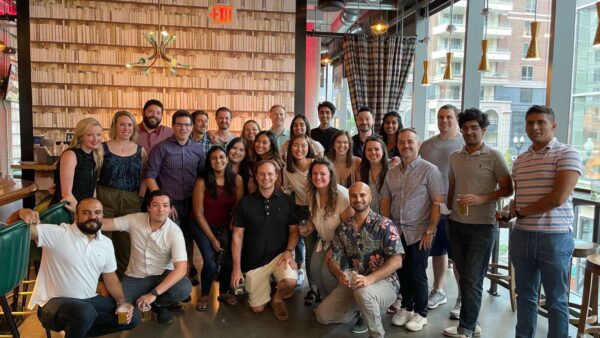Sponsored by Monday Properties and written by ARLnow, Startup Monday is a weekly column that profiles Arlington-based startups, founders, and other local technology news. Monday Properties is proudly featuring 1515 Wilson Blvd in Rosslyn.
There are two “waves” one Arlington analytics company is riding: the health care industry’s inefficient use of data and the need for the U.S. to get a handle on health care costs.
Virginia Square-based CareJourney was founded in 2014 and uses data analytics to help organizations understand their customers and efficiently grow as the industry focuses more on keeping people healthy rather than just treating ailments.
CareJourney started as a service advisory business, so it was providing management consulting to the first few customers, CEO Dan Ross said.
“Pretty soon we figured out that we were sending some of the same things to each customer and so it was kind of a hint that we were on to something that could be repeatable software,” he said. “And so one of the first things we did, you know, in about three, two years in, was to start to pivot into a software business.”

CareJourney has about 120 customers, including health care organizations and providers. Ross said the company’s growth has been fast, adding about 10 to 15 customers every quarter since it began focusing on software in 2017.
And last year, CareJourney began partnering with other companies as well. It recently announced a new partnership with Credo Health, which automates digital medical record retrieval. The partnership allows clients to grow more efficiently and manage care for an increasing number of patients.
“When you put the two pieces of technology together, in our case, our data with their software, it just allows their end customers to do more than they would have been able to do just with the Credo software,” Ross said.
CareJourney has about five partners similarly incorporating the CareJourney data into their services.
Ross attributes the company’s success to its hyper-focus on solving customers’ problems, and its hiring, developing and coaching employees, as well as building a good culture. He said it has about 100 full-time employees, mostly in the D.C. area.
When CareJourney was started, its founders — Ross, Aneesh Chopra and Sanju Bansal — lived locally and had already started other businesses in the area, so Arlington was a natural choice to locate the new company.
“We expected to be hiring a lot of tech-oriented people… Arlington is like one of the hotbeds locally of places to start and have a tech business,” Ross said. “So it’s kind of an easy choice, nearby and sensible.”
Ross said to start a high growth business, a company needs to be in an important and large space and “riding some waves.”
“The adoption of analytics, technology in health care, and also this like screaming need for more efficiency are two big waves that we ride,” he said.
As the health care industry increasingly transitions to focus on incentivizing health systems to keep people healthy — called value-based care — versus treating them for illness and ailments, the need for data analytics is also growing.
“The whole point of value-based care is not to pay for when someone’s sick, whatever that is, but instead to flip the incentives around and incent the health care delivery system to take care of patients, whether or not they are sick,” Ross said.
One example is when using CareJourney’s data, one of its clients noticed a high number of hospital admissions over a month or two stemming from a similar condition.
“And so using our data, they were able to go back and look and say ‘oh, well, people who hadn’t seen a urologist — as this is in the senior population — had this, like, unusually high rate of hospital admissions from UTIs,'” Ross said.
So the client implemented a urologist screening, and the data showed that it prevented hospital admissions.
“When you keep somebody out of the hospital, that’s just a huge win in health care,” Ross said. “That’s probably the number one thing we can do, is just, in general, keep people out of the hospital.”


